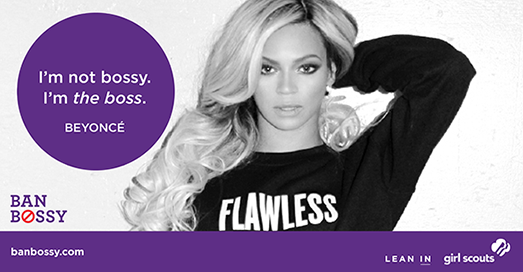Celebrities and role models including Beyonce, Michelle Obama, UN Women Executive Director, Phumzile Mlambo-Ngcuka, as well as the Lean In Foundation and the Girl Scouts have put their star power behind a new online campaign for young girls called Ban Bossy.
Ban Bossy aims to encourage young girls to be leaders and to not let stereotypes and labels destroy their confidence or hold them back from realising their dreams and becoming strong, independent leaders in their own right.
“When a little boy asserts himself, he’s called a ‘leader’. Yet when a little girl does the same, she risks being branded ‘bossy'”, the campaign home page reads.
Ban Bossy has published downloadable leadership tips and tools for young girls, their parents and teachers as well as business managers. It also has an active social media campaign running where anyone can share posters, tips, facts and tips from the site via social networks or email, and check out all their activities on Instagram.
As well-intended as Ban Bossy is, not everyone agrees with it. A lot of parents, bloggers and journalists have criticised it and said that it isn’t the answer. There’s even a debate raging on the campaign’s promo video (watch it below) which has been viewed over 1 million times on YouTube.
“I know I won’t be the first to say this, but the campaign itself is kind of bossy. And I invoke my right to be balky,” writes Margaret Talbot on The New Yorker. “Bossy is a useful descriptive word that invokes a particular kind of behavior. It’s not actually a synonym, derogatory or otherwise, for leadership or authoritativeness, nor necessarily a criticism of women who embody those qualities.”
Supporters of the campaign argue that the term Ban Bossy is being taken too literally and the connotation behind it is not being looked at.
“If the author believes Sandberg’s talk was only about a term and not about something much more then that, she is a prime example as to why women and men need to take a step back and look at the issues women face in the work place. The term bossy is symbolic of the every day work culture of less than that women have to face,” comments a reader on a post featured on NYMag.
So should we #BanBossy? Well, taking all of these points into consideration, it’s ultimately up to parents and other adult figures in girls’ lives to decide how this message is portrayed and whether the campaign works for their daughters or not.
[Image: Ban Bossy]

